|
|
|
Sort Order |
|
|
|
Items / Page
|
|
|
|
|
|
|
| Srl | Item |
| 1 |
ID:
178603
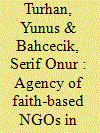

|
|
|
|
|
| Summary/Abstract |
While Turkish faith-based NGOs have been involved in delivering humanitarian aid for two decades, the relations of these organizations with the state have not received adequate scholarly attention. The main purpose of this article is to address this gap by asking what roles NGOs play in Turkey's humanitarian aid policy and practice. Despite the relative isolation of Turkey's administrative structure as a result of a strong state tradition, this paper shows that NGOs attempt to play political roles in Turkish foreign policy. The study relies on an analytical framework derived from constructivism to examine the agenda-setting and information-providing activities of Turkish NGOs between 2004 and 2016. Based on findings from a series of semi-structured interviews with 25 respondents from nine different NGOs and three state institutions, this artilce expands the research agenda on Turkey's foreign aid and shows that NGOs function as knowledge-providers, powerful catalysts for humanitarian aid activities, and influential voices in bringing humanitarian issues to light.
|
|
|
|
|
|
|
|
|
|
|
|
|
|
|
|
| 2 |
ID:
147487


|
|
|
|
|
| Summary/Abstract |
Annual allocations of bilateral and multilateral humanitarian assistance to conflict-affected states total billions of dollars each year. Humanitarian assistance plays a vital role in sustaining vulnerable populations. However, inflows of such aid may also exacerbate violence by both threatening insurgents and creating incentives for these groups to extend or deepen control over the areas in which aid is concentrated. Insurgent efforts to ameliorate threats and co-opt resources ultimately raise the risk of conflict between insurgent and counterinsurgent forces. We use recently constructed geo-located data on both aid commitments and conflict events in a sample of twenty sub-Saharan African countries during the post–Cold War era to evaluate the impact of aid on violence. Even after accounting for the non-random assignment of aid within conflict zones, we find that humanitarian aid increases the frequency of subsequent violent engagements between rebel and government forces in the areas in which aid is concentrated. Importantly, however, we find no evidence that other forms of foreign development aid exacerbate or prolong violence in the areas in which they are allocated.
|
|
|
|
|
|
|
|
|
|
|
|
|
|
|
|
| 3 |
ID:
106786
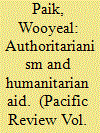

|
|
|
|
|
| Publication |
2011.
|
| Summary/Abstract |
Severe natural disasters encourage the international community to donate humanitarian aid (materials and personnel) to the affected country, which is critical for its human security. Some authoritarian regimes, however, rationally reject such aid despite the dire situation of their people. When an authoritarian regime decides whether to accept foreign humanitarian aid for severe natural disasters or not, it considers two political factors: (1) the risk and (2) the need to accept aid, which is a type of exogenous shock that may threaten the stability of the regime and its survival. This paper considers the factors of risk (regime type, domestic struggle, and international pressure) as inherent and contingent determinants of regime stability, and the need factors by looking at the different types of sources from which the regime gains its legitimacy (electoral mandate, economic development, or ideology). If the risk is less and the need is more, the regime is more likely to accept the aid, otherwise not. The two authoritarian regimes hit by severe natural disasters - the 2008 Sichuan earthquake in China and the 2008 Cyclone Nargis-caused floods in Myanmar - are considered as salient cases for the external variation between authoritarian regimes. This paper also finds some critical internal variation within an authoritarian regime and its differing responses during the 2008 Sichuan earthquake and two other disasters - the 1976 Tangshan earthquake and the 2010 Qinghai earthquake.
|
|
|
|
|
|
|
|
|
|
|
|
|
|
|
|
| 4 |
ID:
156833
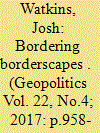

|
|
|
|
|
| Summary/Abstract |
This article documents Australia’s use of border security support and humanitarian aid as border externalisations immobilising asylum seekers as far from Australia as possible. The Australian Government frames border securitisation through regionalism, as an effort to achieve a “regional solution” to asylum seeking irregular migration. Correspondingly, scholars have documented Australia’s externalisations in Southeast Asia and the Pacific. However, Australia’s efforts are not regionally circumscribed and this article analyses the spatial and temporal flexibility of Australia’s border externalisations; Australia’s strategy of targeting borderscapes of asylum seeking as they emerge and change. In doing so, the article examines how the Australian Government has assembled externalisations in South Asia, the Middle East, and North Africa. Australia’s use of humanitarian aid to make places housing asylum seekers more hospitable, yet confining, to the displaced is detailed. Also analysed is Australia’s border security support to source countries and countries of first asylum to immobilise asylum seekers. The article demonstrates that Australia has sought to manifest not only a territorial buffer zone in Southeast Asia, but use border externalisations in the Middle East, South Asia, and North Africa to secure places and displaced populations. This is argued to be a preventative strategy of risk management designed to preempt future asylum geographies and forge extraterritorial migration control.
|
|
|
|
|
|
|
|
|
|
|
|
|
|
|
|
| 5 |
ID:
167160
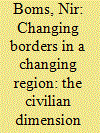

|
|
|
|
|
| Summary/Abstract |
The Syrian civil war – which has largely ended following bloody 8 years – serves as a prime case study of mechanisms which challenge border realities, as well as geography and demography, through engagement of manifold internal and external actors. This article discusses these processes and their implications by focusing on the Syro-Israeli borderland. It analyses the main actors and their motives, geography of interactions, as well as implications for humanitarian situation and security considerations. It is argued that while the dynamics in the Syro-Israeli borderland have several unique characteristics, they also point to a broader process of re-drawing borderlands and lines of influence in the Middle East region.
|
|
|
|
|
|
|
|
|
|
|
|
|
|
|
|
| 6 |
ID:
168480
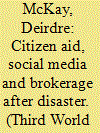

|
|
|
|
|
| Summary/Abstract |
In a crisis, aid providers deliver humanitarian relief across a hierarchy of organisations where influence and capacity map to their scale of operations. On the front lines of crises, ‘citizen aid’ is what small, local and informal groups offer to fellow citizens. These citizen aid groups are well-networked in place and tend to work through longstanding personal relationships. In the Philippines, citizen aid groups frequently support their activities by documenting their work with photos of beneficiaries to solicit donations from within the country and around the world across social media platforms. This paper builds on recent debates on brokerage through a case study of citizen aid in the relief effort after Typhoon Haiyan (2013–2017). Using this case-study approach, we demonstrate how social media has produced novel forms of brokerage shaped by circulating images online. This new kind of brokerage involves a layered network of brokers that both shapes citizen aid efforts and creates new channels for localising aid, enhancing the control of citizen groups in the Global South over aid.
|
|
|
|
|
|
|
|
|
|
|
|
|
|
|
|
| 7 |
ID:
169324
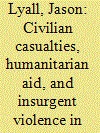

|
|
|
|
|
| Summary/Abstract |
Indiscriminate violence against civilians has long been viewed as a catalyst for new rounds of violence in civil wars. Can humanitarian assistance reduce violence after civilians have been harmed? Crossnational studies are pessimistic, drawing a connection between humanitarian aid and increased civil war violence, lethality, and duration. To date, however, we have few subnational studies of wartime aid and subsequent violence. To examine this relationship, I draw on the Afghan Civilian Assistance Program (ACAP II), a USAID-funded initiative that investigated 1,061 civilian casualty incidents (2011–13). Aid was assigned as if randomly to about half (55.8%) of these incidents, facilitating counterfactual estimation of how assistance affected Taliban attacks against the International Security Assistance Force, Afghan forces, and civilians. Challenging prior studies, I find that ACAP was associated with an average 23 percent reduction in attacks against ISAF, but not Afghan forces or civilians, at the village level for up to two years after the initial incident.
|
|
|
|
|
|
|
|
|
|
|
|
|
|
|
|
| 8 |
ID:
160094
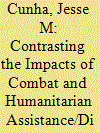

|
|
|
|
|
| Summary/Abstract |
We study the differential impacts of combat and humanitarian assistance/disaster relief (HA/DR) missions on the mental health of U.S. Marine Corps members. The deployment experiences of any individual Marine are plausibly random conditional on the observable characteristics which are used to assign Marines into units. Leveraging this exogenous variation, we compare the incidence of post-traumatic stress disorder (PTSD) and suicide deaths among Marines who deployed to either Operation Enduring Freedom/Operation Iraqi Freedom (OEF/OIF) or HA/DR missions between 2001 and 2011. We find that the hazard of PTSD is close to eight times higher among Marines returning from OEF/OIF compared to those never deployed, and just 1.33 times higher among those returning from HA/DR (and never participated in OEF/OIF). Those returning from OEF/OIF missions are 1.81 times more likely than those never deployed to die by suicide when they were still active duty, and the hazard increases to almost 3 after they have left the military. In contrast, we find no difference in the hazards of suicide death between those that deployed to only HA/DR missions and non-deployed Marines.
|
|
|
|
|
|
|
|
|
|
|
|
|
|
|
|
| 9 |
ID:
130569
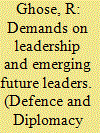

|
|
|
| 10 |
ID:
149492
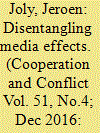

|
|
|
|
|
| Summary/Abstract |
Whether and how media are able to influence policy and the political decision-making process is still the topic of much debate. However, if news media are indeed able to influence policy, they are commonly believed to do so indirectly through their agenda-setting function – by getting issues onto the political agenda after sudden peaks of attention. Yet, despite the assertion of agenda-setting theory that policy changes occur mainly through steady advocacy of policy alternatives, little attention has been paid to the long-term effects of media exposure. The analysis of emergency assistance in Belgium from 2000–2008 shows that short-term and long-term media attention to specific countries affect decision-making in quite different ways. This study reveals different ways in which media attention can impact policymaking, as short-term attention mainly determines which countries receive assistance, while long-term attention affects the amount of assistance granted.
|
|
|
|
|
|
|
|
|
|
|
|
|
|
|
|
| 11 |
ID:
116864
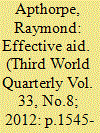

|
|
|
|
|
| Publication |
2012.
|
| Summary/Abstract |
International aid workers are invisible in the absence of data as to who cleaves to what knowledges and practices about how aid works to be effective. When it is similar or different best practice positions that are taken is another unknown, despite what this could tell us about aid effectiveness. This paper identifies through their everyday poetics two of the angles on 'how aid works' that aid workers take. One angle displays a programmatic, or 'like clockwork' aesthetic about how aid is said to 'work' through causal mechanisms, provided only that the right policy and 'the tools we have' are put in place and implemented. The other, a 'like an artwork' aesthetic, puts constitutive institutions and new interpretative understandings to the fore. The aid effectiveness issues and reforms associated with the 2005 Paris Declaration on Aid Effectiveness and subsequent meetings, the latest in Busan in 2011, do not address many, if any, of the issues raised in this paper. They should.
|
|
|
|
|
|
|
|
|
|
|
|
|
|
|
|
| 12 |
ID:
174858
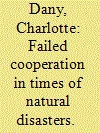

|
|
|
|
|
| Summary/Abstract |
This article asks why economically strong democracies reject humanitarian aid after severe natural disasters, focusing on the Kobe earthquake in Japan (1995), India’s response to the Indian Ocean tsunami (2004), and Hurricane Katrina in the United States (2005). It explains these rejections of humanitarian aid by analyzing the decision-makers’ ‘self-perceptions’ through the factors of manageability, national role perceptions, and domestic political impact, as well as ’other-perceptions’ through their relations to donors and the nature of the aid offers. It finds that even in those disaster-prepared and economically strong democracies, state leaders rejected humanitarian aid not simply because they had sufficient disaster management capabilities. Rather, bureaucratic hurdles and administrative failure impeded aid acceptance. Moreover, conceptions of those countries’ roles as established or emerging donors, as well as domestic political factors influenced their decisions. Ultimately, the dominant explanations focusing on wealth and capabilities are thus too shortsighted. Not only giving but also rejecting humanitarian aid follows political considerations.
|
|
|
|
|
|
|
|
|
|
|
|
|
|
|
|
| 13 |
ID:
128882
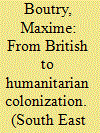

|
|
|
|
|
| Publication |
2013.
|
| Summary/Abstract |
The humanitarian response to the disaster caused by Cyclone Nargis that hit the Ayeyarwady Delta region of Myanmar in 2008 is a pertinent example of a very specific phase in humanitarian response at the transition between emergency and development. The author shows that this phase, known as 'early recovery', being built on the specific characteristics of the emergency (lack of time and lack of means and input) and oriented towards development, is one in which the humanitarian aid agency is relatively restricted to the humanitarian sphere itself. As a result, the ideological discourse lengthily denounced by the post-structuralist anthropology of development - as a set of Western values imposed on the 'developing' countries to assert a new form of dominion - is actually powerful and quasi-monolithic in shaping the consequences of humanitarian aid. While there is no 'arena' for the 'beneficiaries' to discuss the aid's agency, a 'methodological populism' approach reveals, on the one hand, the antagonisms between a humanitarian ideology conveying considerations such as 'horizontal' communities versus 'hierarchical bonds' and, on the other, the similarity of its socioeconomic consequences on the Delta's society to those of the British colonial period.
|
|
|
|
|
|
|
|
|
|
|
|
|
|
|
|
| 14 |
ID:
158920
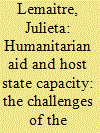

|
|
|
|
|
| Summary/Abstract |
How can humanitarian actors operate in a host state with significant subnational variations in willingness and capacity to meet its obligations? This is an issue of pressing importance, given the expansion of humanitarian aid to middle-income countries with growing state capacity, but with persistent infrastructural weakness in their periphery. The article illustrates the challenges and potentialities of engaging these states through the case study of the Norwegian Refugee Council (NRC) in Colombia. It describes the way the NRC has located its offices in peripheral areas, and how its activities have fostered the rule of law, successfully using rights-based approaches to strengthen subnational state institutions, activate and mobilise citizen demands and bridge national and subnational administrations. The article concludes that these activities, operated by officers with extensive practical knowledge and local trust networks, can open the way for durable solutions for humanitarian crisis, but can also provoke backlash from subnational actors.
|
|
|
|
|
|
|
|
|
|
|
|
|
|
|
|
| 15 |
ID:
082935
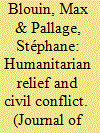

|
|
|
|
|
| Publication |
2008.
|
| Summary/Abstract |
The authors examine the effects that famine relief efforts (food aid) can have in regions undergoing civil war. In the model, warlords seize a fraction of all aid entering the region. How much they can loot affects their choice of army size; therefore the manner in which aid is delivered influences warfare. The authors identify a delivery plan for aid that minimizes total recruitment in equilibrium
|
|
|
|
|
|
|
|
|
|
|
|
|
|
|
|
| 16 |
ID:
146661
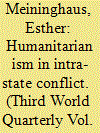

|
|
|
|
|
| Summary/Abstract |
This article argues that humanitarian aid in intra-state conflict plays a crucial but largely unrecognised role in shaping the preconditions for negotiations for peace and post-conflict reconstruction. Drawing on a spatial theory approach, it identifies the role of humanitarian aid as not being temporary and independent, but as forming an integral part of the daily lives of local communities and of continuously evolving structures of governance during conflict. As a result, significant imbalances in the distribution of aid between different geographical areas, as highlighted in the current Syrian war, threaten not only the immediate survival of civilians, but also their future.
|
|
|
|
|
|
|
|
|
|
|
|
|
|
|
|
| 17 |
ID:
166684
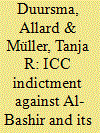

|
|
|
|
|
| Summary/Abstract |
The impact of the International Criminal Court (ICC) on peace processes has received much scholarly attention. We argue, based on the ICC arrest warrant against Sudanese President Omar al-Bashir, that ICC indictments against government officials not only can be detrimental to the prospects for peace, but can also negatively affect everyday practices of peacekeepers and humanitarian workers. We draw on a combination of quantitative and qualitative data in order to develop our argument. We interrogate some measurable consequences of the indictment in relation to the work of the United Nations – African Union Mission in Darfur (UNAMID) as well as humanitarian actors in Darfur. We do so using a data set compiled to support the work of UNAMID. We also draw on interviews with UN and UNAMID staff, aid workers, and representatives of the conflict parties. Our analysis shows that the indictment of President al-Bashir was perceived by the Sudanese government as the continuation of a confrontational approach pursued by the international community. We further show that the indictment accelerated patterns of obstruction and intimidation of peacekeeping actors, other third-party actors, and local staff associated with these. This complicated the everyday activities of peacekeepers and humanitarian efforts.
|
|
|
|
|
|
|
|
|
|
|
|
|
|
|
|
| 18 |
ID:
125229
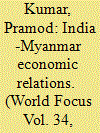

|
|
|
|
|
| Publication |
2013.
|
| Summary/Abstract |
To make India's 'Look East Policy' more effective and fruitful, engagement with Myanmar becomes vital, as its location is such that it can prove to be a bridge between India and the ASEAN. Though India-Myanmar relationship dates back to the era of great Indian king Asoka but due to the weaker kings in the subsequent centuries, we find the invisibility of relationship between the two countries. In recent years both the countries have realized the urgency of a close and operative relationship and thus they are putting every effort to take it forward to new heights. India is engaged in Myanmar in many ways whether it is humanitarian aid and assistance or the development of infrastructural project or industries or in providing training to IT professionals etc. Apart from this, India is providing aid to Myanmar for different purposes. Myanmar has allowed Indian firms to engage in energy sector such as natural oil and gas and also in the field of hydropower. It is extremely important for India as India is an energy-scarce country and to have energy security, India has to look beyond the west Asian countries and thus, Myanmar becomes vital.
|
|
|
|
|
|
|
|
|
|
|
|
|
|
|
|
| 19 |
ID:
144774
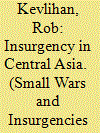

|
|
|
|
|
| Summary/Abstract |
This article considers the experience of civil war in Tajikistan (1992–1997). This civil war represents the most significant violent episode in post-Soviet Central Asia; over a five-year period at least 50,000 people were killed and approximately one tenth of the population were displaced. This article will examine the role of local and international actors during this civil war, with a particular focus on the role that international aid and aid agencies played in governance of vulnerable populations and the impact these interventions had on conflict dynamics and the ability of insurgents to govern in areas under their control.
|
|
|
|
|
|
|
|
|
|
|
|
|
|
|
|
| 20 |
ID:
144334
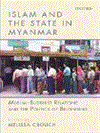

|
|
|
|
|
| Publication |
New Delhi, Oxford University Press, 2016.
|
| Description |
xix, 345p.hbk
|
| Standard Number |
9780199461202
|
|
|
|
|
|
|
|
|
|
|
|
Copies: C:1/I:0,R:0,Q:0
Circulation
| Accession# | Call# | Current Location | Status | Policy | Location |
| 058623 | 322.1/CRO 058623 | Main | On Shelf | General | |
|
|
|
|
|
|
|
|
|